The flavor characteristics of coffee in El Salvador introduce which coffee in El Salvador is the most famous.
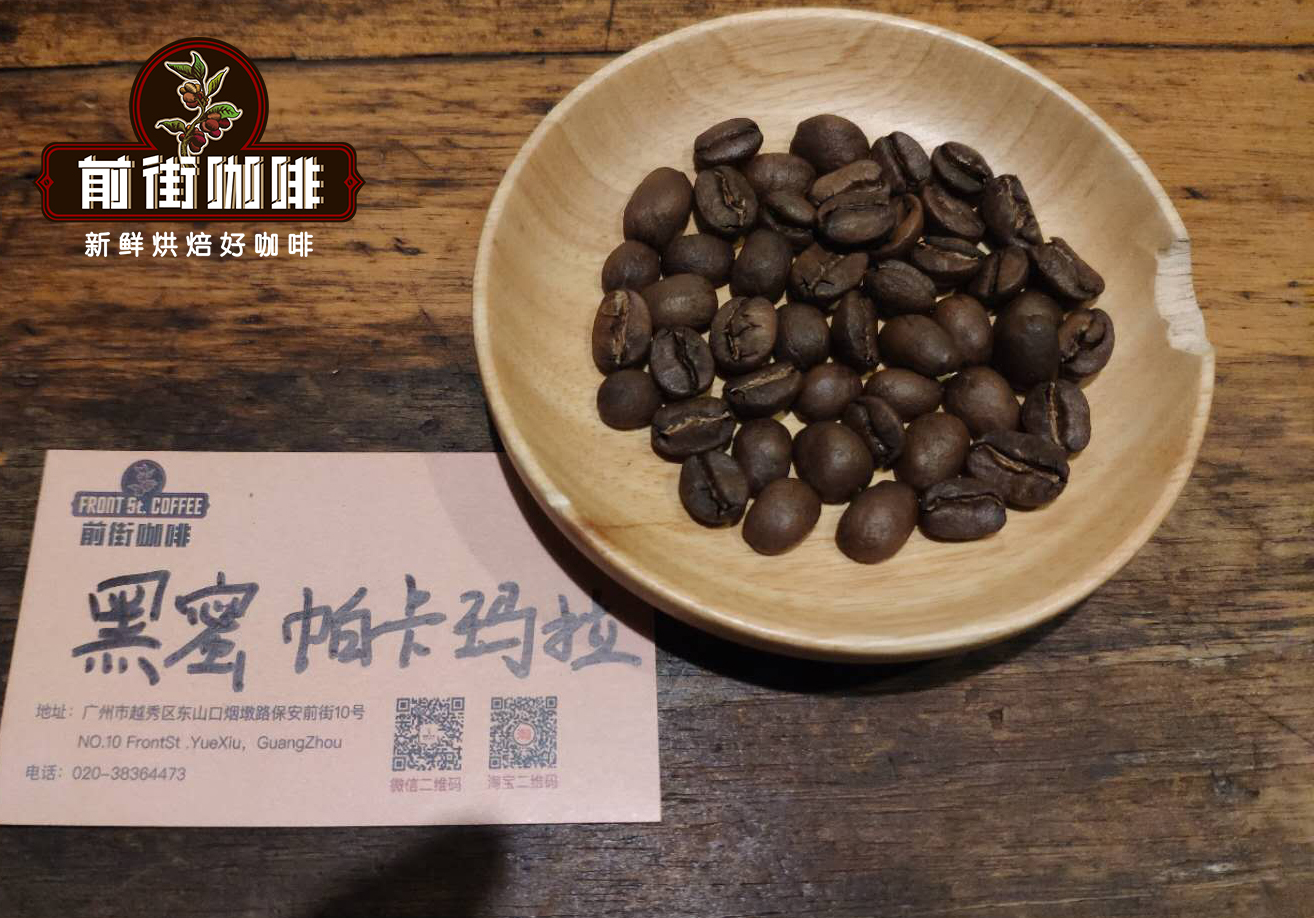
El Salvador is the smallest and most densely populated country in Central America. It is also a world-renowned coffee producer. Coffee has been growing rapidly since the middle and late 19th century and has been an important contributor to El Salvador's economy for 100 years.
However, coffee production in El Salvador has been declining since the 1980s and now accounts for less than 2 per cent of total exports. Nevertheless, it is now a famous producer of specialty coffee and is home to some of the most popular varieties in the world.
Carlos Morales is the country manager of Caravela Coffee El Salvador. He told me that the country produces about 850000 metric tons (85000 tons) of coffee a year, which is grown by about 20000 producers across the country. Carlos told me that the average area of the coffee farm that Calavera cooperates with El Salvador is 1.5 hectares.
In fiscal year 2019, coffee drinkers in El Salvador consumed 18 million kilograms of coffee. This means that El Salvador's per capita coffee consumption is about 2.8 kg, which is at a medium to high level among Latin American producing countries.
Although coffee was the main driver of El Salvador's economy in the 1920s and 1930s, accounting for a staggering 90 per cent of exports, the situation changed in the late 20th century. The civil war that lasted from 1979 to 1992 led to the loss of coffee production across the country. From 1979 to 1986 (just seven years), coffee production fell by an astonishing 19%.
In addition after the end of the war in 1992 El Salvador found it increasingly difficult to enter the international market in the face of competition from other sources. OEC reported in 2018 that coffee accounted for only 1.86 per cent of El Salvador's total exports, 42 per cent of which went to the United States.
Nevertheless, the Salvadoran Coffee Council developed a five-year development plan in 2015 to revitalize the country's coffee industry. This focuses on improving the position of Salvadoran coffee in the global market, promoting domestic consumption and increasing the production of high-quality coffee.
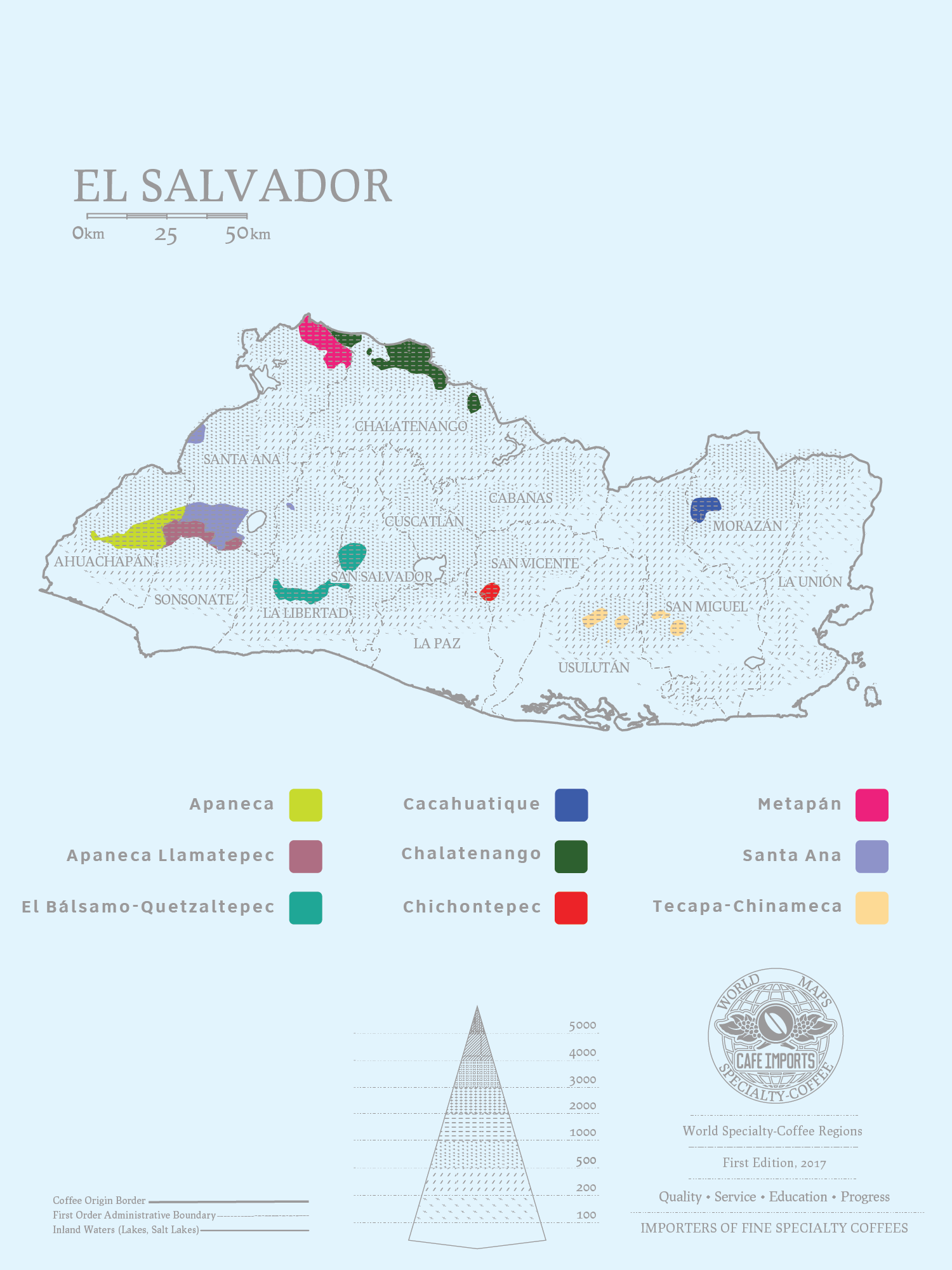
Today, almost all Salvadoran coffee grows in the dark. Figures released by ICO estimate that more than 60 per cent of all Arabica coffee grown in the country is bourbon, with Pacas and Pacamara being the second and third most popular varieties, respectively.
The World Coffee Research Corporation estimates that about 25 per cent of all coffee grown in El Salvador is Pacas from the country. It was discovered by the Pacas family in 1956 (hence its name) and is a natural variation of the bourbon variety.
Pacas plants were sought after for their high yield and small size (meaning more plants could be grown on smaller farms) and later crossed with Maragogipe varieties to create Pacamara.
The Pacamara is one of the most popular varieties in the world, with elegant acidity, medium to heavy body and almost creamy taste. El Pacamara (Salvadoran Pacamara) is now grown in Honduras, but often has aromas of butterscotch, chocolate, red berries and citrus fruits.
In order to refocus on the production of quality coffee in El Salvador, some producers have begun to try their processing methods. Santos Arnulfo Diaz grows Pacas and Pacamara varieties in Finca La Trilla in Chalatenango in the north-west of the country.
Producers in El Salvador usually process coffee differently throughout the harvest season, from December to March, Santos said. "about 10% of the coffee we sell is washed with high amino groups (parchment), and the rest is honey and natural coffee."
Carlos told me that producers usually experiment until they find a viable way. This usually forms a trend with the rest of the country.
"producers are always focused on taking advantage of the best price they can get," he told me. " "for example, if one manufacturer has begun to focus on honey processing, then others will transition to honey processing, even during the entire production process of the next harvest."
Carlos told me that Salvadoran farmers in Caravela usually produce coffee of AA grade or above. For honey and naturally processed coffee, this can be converted into significantly higher-quality cups, he said. Finally, he added, those who start to build long-term relationships and focus on PECA support are mainly those who produce RTB and A-grade coffee.
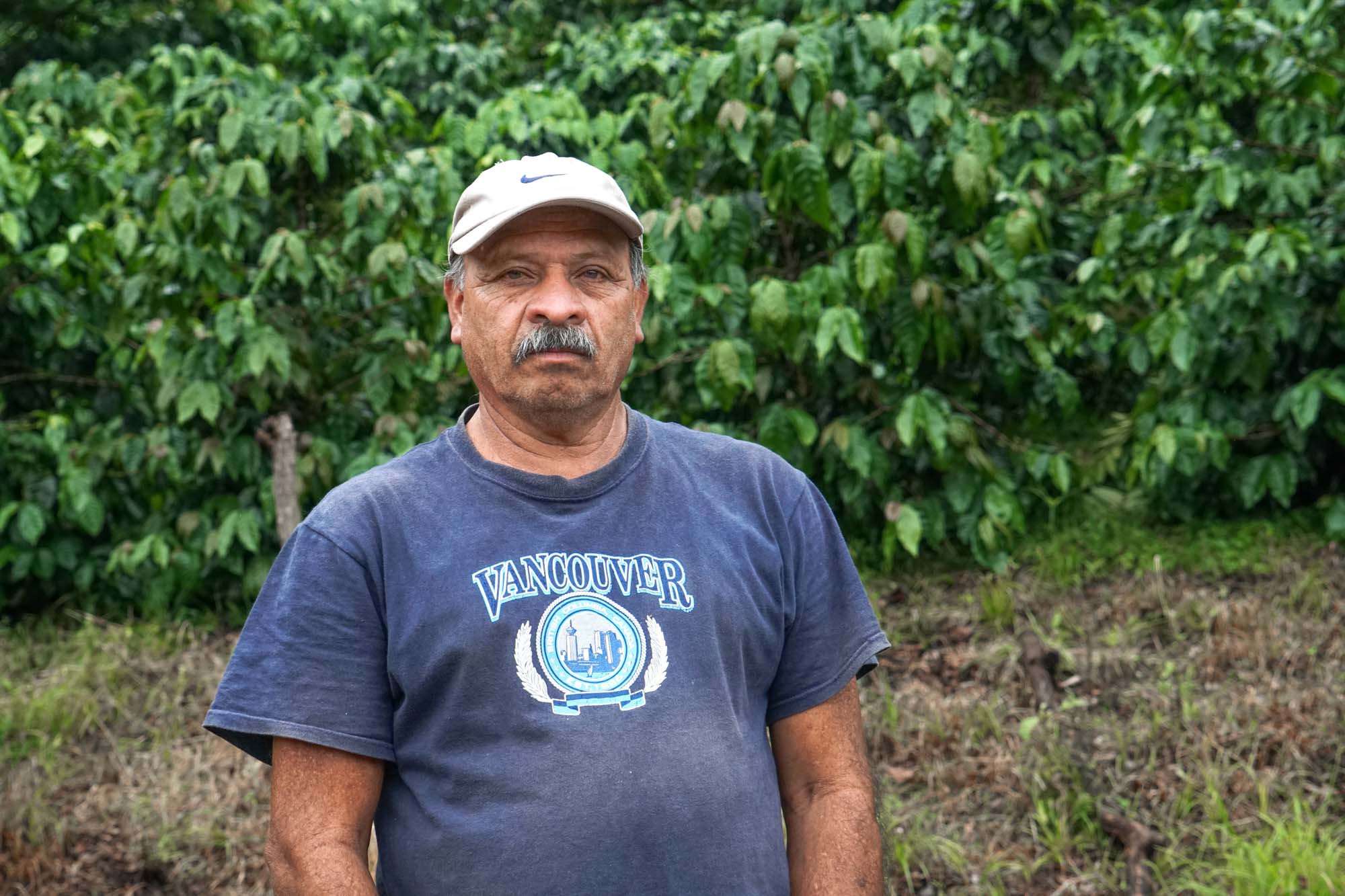
El Salvador producing area
Although the harvest season is from December to March, it reaches its peak in January and February.
In many of these areas, producers can join cooperatives and local coffee growers' associations. "this is a way for producers to get the materials and tools they need to improve farm production," Carlos said. "
Santos's farm is located in Chalatenango, one of the smaller producing areas of El Salvador. He told me that because of the size of the region, it was difficult to find support from other organizations. "because the number of producers in my area is very small, it is not easy to find producers' cooperatives nearby."
As a result, Carlos says, for producers that need further support, Caravela offers a PECA (grower Education Program) program. "[this program] helps to continuously educate producers and their families about best practices," Carlos told me. "this enables them to improve productivity and quality, which ultimately leads to greater profits."
To help producers, Carlos told me that Caravela is still working with producers on loyalty programs. "We first lend GrainPro bags to manufacturers to improve production efficiency," he said. This also (helps to reduce stress) must move the coffee immediately to maintain its quality. "
Some farms in El Salvador are located in remote areas or mountainous areas, thus delaying the transport of crops. High-quality packaging effectively extends the shelf life of coffee, that is, under adverse weather conditions (otherwise it will lead to a decline in quality).
Sustainable Development and quality
Like many producing countries there are indeed some issues of traceability and transparency in El Salvador which further affect the sustainability of the entire supply chain. It is difficult for producers to obtain information without which it is often difficult for them to optimize the quality of their crops.
Carlos told me that quality problems often show up in the process. As a result, he said, "agronomists participating in the PECA program can 'turn off the feedback loop' and provide producers with timely and actionable responses that enable them to 'solve' problems quickly. This means that producers can [solve any problem] and get paid for quality coffee as soon as possible. "
Carlos added that many producers in El Salvador also have cash flow difficulties. Many producers do not have many financial options and rely entirely on timely coffee income. Long-term payment terms will make life more difficult.
"We are trying to change this model by eliminating risks from producers and paying producers fairly and almost immediately," he said. "
In order to improve cash flow, manufacturers usually distinguish the quality of different batches and then sell products that do not meet specific quality standards. For example, some batches may be too old, while others (such as the first batch in the harvest) may not provide the required quality.
"usually, we make coffee, and if it's traditional coffee instead of high-quality coffee, we let them know immediately," Carlos said. " "then we suggest that they sell it immediately to speed up cash flow." This allows producers to invest in their farms and improve the quality of crops in the long run.
"[to improve financial stability], we often encourage Salvadoran producers not to wait until they have harvested all the coffee before selling it," Carlos added. "We can buy it anywhere for at least one bag and often buy it during harvest and processing."
This ensures that cash flow is consistent throughout the harvest season, rather than the last "lump sum", he said. Carlos said that by buying directly, Calavera helps to improve the traceability of coffee producers.
Finally, Carlos added that because there are fewer participants buying coffee, they can provide direct feedback. The producer can then act on any proposal more quickly and make improvements in a shorter period of time.
Buyers of Salvadoran coffee should keep these points in mind, but Santos says human factors often make a difference.
"what we like most about buyers is that they try to visit us," he said. " "We want to build relationships and show our work to buyers around the world. But it is equally important that these relationships be fair and that fair prices be paid to [El Salvador] producers. "
Carlos also advises buyers to keep in mind that there are many rare varieties and unique processing methods throughout El Salvador. "El Salvador has a lot of expensive Pacas and Pacamaras, as well as a lot of honey and natural coffee.
"it is important to consider the risks and work of producers with regard to these coffees; we recommend that producers also take this into account in their pricing."
He also advises buyers to keep in mind that these varieties are ideal. He said that through the use of forward contracts, the security and stability of both parties can be improved.
El Salvador is a different origin. From its long history and the popularity of varieties such as Pacas and Pacamara to the processing methods that producers are trying, it has a lot of specialty coffee to offer.
The next time you visit the roaster or your local coffee shop, consider buying some Salvadoran coffee (if any). The complex taste you encounter may mean that you have found a new taste.
Important Notice :
前街咖啡 FrontStreet Coffee has moved to new addredd:
FrontStreet Coffee Address: 315,Donghua East Road,GuangZhou
Tel:020 38364473
- Prev
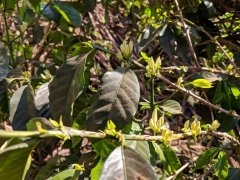
How to brew Beloya coffee with the flavor of Yega Chefeld Coffee and Sidamo Coffee?
Professional coffee knowledge exchange more coffee bean information Please follow Coffee Workshop (Wechat official account cafe_style) when it comes to coffee producing areas in Ethiopia, the famous Yegashifi and Sidamo always have a place in the hearts of coffee lovers. Qianjie Coffee tested the coffee beans in two producing areas by cup, and found that the coffee beans in Yega Xuefei producing area have a faint floral fragrance and bring flavor.
- Next
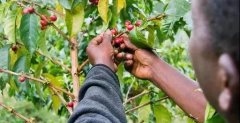
Effect of brewing water temperature of coffee beans in Yejia Sheffivoka Cooperative on the flavor of Yega Chevoca coffee
Professional coffee knowledge exchange more information about coffee beans Please follow the coffee workshop (Wechat official account cafe_style). Friends who have drunk Ethiopian coffee beans believe many people have heard of Waka beans. This bean comes from the small town of Werka in southern Ethiopia. Through the cup test on the front street, it is believed that the Waka coffee beans have a fresh and elegant flower fragrance, clean, bright and sour characteristics.
Related
- Beginners will see the "Coffee pull flower" guide!
- What is the difference between ice blog purified milk and ordinary milk coffee?
- Why is the Philippines the largest producer of crops in Liberia?
- For coffee extraction, should the fine powder be retained?
- How does extracted espresso fill pressed powder? How much strength does it take to press the powder?
- How to make jasmine cold extract coffee? Is the jasmine + latte good?
- Will this little toy really make the coffee taste better? How does Lily Drip affect coffee extraction?
- Will the action of slapping the filter cup also affect coffee extraction?
- What's the difference between powder-to-water ratio and powder-to-liquid ratio?
- What is the Ethiopian local species? What does it have to do with Heirloom native species?

